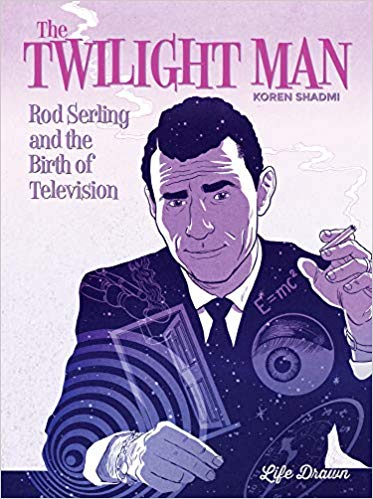Thursday Comics Hangover: Submitted for your approval

Yesterday was the 60th anniversary of the world premiere of The Twilight Zone, a show that would forever change the scope of what television was capable of as a storytelling medium. Yesterday was also the publication date for The Twilight Man, a comic biography of Twilight Zone creator Rod Serling by Koren Shadmi.
If you're unfamiliar with Serling, you are likely at least very familiar with his legacy: Black Mirror was pretty much straight-up a Twilight Zone knock-off with a technological angle. You likely have seen at least the climax of Planet of the Apes, the screenplay of which was written by Serling. He helped shape our idea of what science fiction can do as an agent of social change, and he opened up television to a world of possibilities that are still being explored today.
Of course, the question about any comics biography about an artist who excelled in another medium like television is, why does this biography need to be in comics form? Wouldn't it make more sense, be more thematically interesting, to tell Serling's story as a TV movie or series? Shadmi answers the question of "why comics?" by embracing the major themes of Serling's work and echoing those themes throughout the book. Like in the Twilight Zone, Shadmi's story veers into bizarre visuals, adding an air of menace to Serling's story that suits him down to his shoes. (And of course, like the best Twilight Zone episodes, the book is presented in glorious black and white.)
Serling's early military career, in which the unexceptional physical specimen volunteered for pretty much any dangerous duty he could get his hands on, is marked with the horror and sudden reversals of fortune that we recognize in Serling's work. And as Serling eventually works to find his voice as a broadcast writer, Shadmi illustrates his journeys into weird and sinister fiction as psychedelic trips through mysterious floating doorways, haunted by shadowy monsters at the edges of his peripheral vision.
Shadmi is an excellent cartoonist, finding the right balance between cartooniness and realism. (His figures resemble nothing so much as the work of Jason Lutes.) You might be deceived by his clean linework into thinking that very little is going on in each panel, but if you look closer, you'll notice that Shadmi almost never skimps on backgrounds — he'll draw every piece of debris in a combat scene after an explosion, for instance, just to give a sense of the desolation caused by war. The world feels just as real as our own.
Very few biographies of writers are worth your time — particularly writer biographies told in visual media like film or comics. The interiority of a writer's life rarely makes for decent narrative fodder. But The Twilight Man makes the weakness of the medium — the inability to really reach for the interiority of Serling's writer life — into a strength by pulling the man inside out, and letting us peek into his head. It's a dark ride, with a killer twist. Serling would be proud.